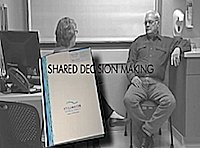Suggestions for journalists reporting on Dartmouth Atlas data

Each time the Dartmouth Atlas issues a new report, there’s a spike in news coverage about the work of the Atlas team. That’s the way news usually works: an announcement, an event – something is spoonfed journalists and they respond. Especially in these more difficult financial times in the news industry when story quotas remain high, but fewer people are asked to do more with less in reporting complex topics.
So, with the most recent Atlas reports released in November and December, we saw these stories from Tyler, Texas to Owensboro, Kentucky to Cedar Rapids, Iowa to Mitchell, South Dakota to Seattle and to San Jose and many places in between:
- Dartmouth research suggests location determines who is cut when
Tyler Morning Telegraph (Tyler, Texas)
- Kentucky health quest stalls
Messenger-Inquirer (Owensboro, Ky.)Picked up on PharmacyChoice.com
- Study: Decisions about surgery often hinge on where you live
The Seattle Times
- Oklahoma passes U.S. rate of elective heart surgery
The Daily Oklahoman
- Study reveals disparity in surgery rates
The Des Moines Register
- With elective surgery, where you live is what you get, says new study
TheRepublic.com (originally published in The Tampa Bay Times)
- S.F. lowest mastectomy rate for over-65s
San Francisco Chronicle
- Surgery for that? Depends where you live
Star Tribune (Minneapolis, Minn.)
- Uninformed patients tend to have more invasive surgeries
St. Louis Post-Dispatch
- Surgery frequency varies by geographic norms, Dartmouth study finds
Kansas City Star
- Report points to variances in health care procedures, based on where patients live
The Gazette (Cedar Rapids, Iowa)
- Report says surgery choice often depends on geography, including in SD
The Daily Republic (Mitchell, S.D)
- Cutting the high cost of end-of-life care
CNN Money
- Wide Variations In Elective Surgeries Among Western Cities
KPBS.org (San Diego, Calif.)
- Cost of Dying: Some Bay Area hospitals combat death aggressively with expensive treatment
San Jose Mercury-News
And this is an incomplete list of news coverage.
But let me suggest that there are “evergreen” stories related to the Atlas research that are good anytime – and for which journalists don’t need to wait for the next announcement, the next news release. What are these stories? A few possibilities:
- Is your region a high-use area? A low-use area? What’s the right rate of utilization? Ahhh, that’s when we get to the real nut graf, as journalists call the heart of the story. Because we don’t know the right rate. And we can’t know the right rate if we don’t know more about patient preferences and values, and if we don’t implement shared decision-making more fully to get at those preferences and values. (One glimpse of the state of decision-making in prostate cancer and heart disease was offered in a recent paper in the Journal of General Internal Medicine.)
- Whether you’re in a high-use area or a low-use area, who are the providers who are the outliers in your area? Why are they outliers? What do their competitors think about them?
- Do local health care consumers know and understand what the variations data show or mean? If so, what are their feelings? Will the data influence their decision-making about provider choice?
- Can you find any providers or patients in your area who have used shared decision-making programs? Were you aware of the extensive experience of Group Health in Seattle with the use of such decision aids? Are your local providers aware of it? Does this look like something that would make sense to try in your community? If so, what would it take? If not, why not? This video provides a closer look at the Group Health experience, showing how this can even handled in a TV news story format.
- But that was actually a video news release from Group Health in Seattle. Look at this real TV news story that did a terrific job reporting on variations in health care, outcomes research, and the value of shared decision-making.
The list of possible local angles is long. I offer my help to any journalist who wants to talk about possible ways to cover these data, their meaning, and their potential impact on the quality of care – locally, regionally, or nationally.
Disclosure: I know this topic fairly well because I worked at Dartmouth throughout the 90s, right down the hall from many of these Atlas researchers. I was an employee of the Foundation for Informed Medical Decision Making and I produced some of the early decision aids in the Foundation’s library. My work is currently supported by that same Foundation, one of whose co-founders was Dr. Jack Wennberg of Dartmouth, whose work was the basis for the Atlas project. I have no current work relationship with anyone at Dartmouth and have complete editorial independence from the Foundation that supports my work. No one there has ever told me what to write or how to write it.
——————————–
Follow us on Facebook,
and on Twitter:
https://twitter.com/garyschwitzer
https://twitter.com/healthnewsrevu
